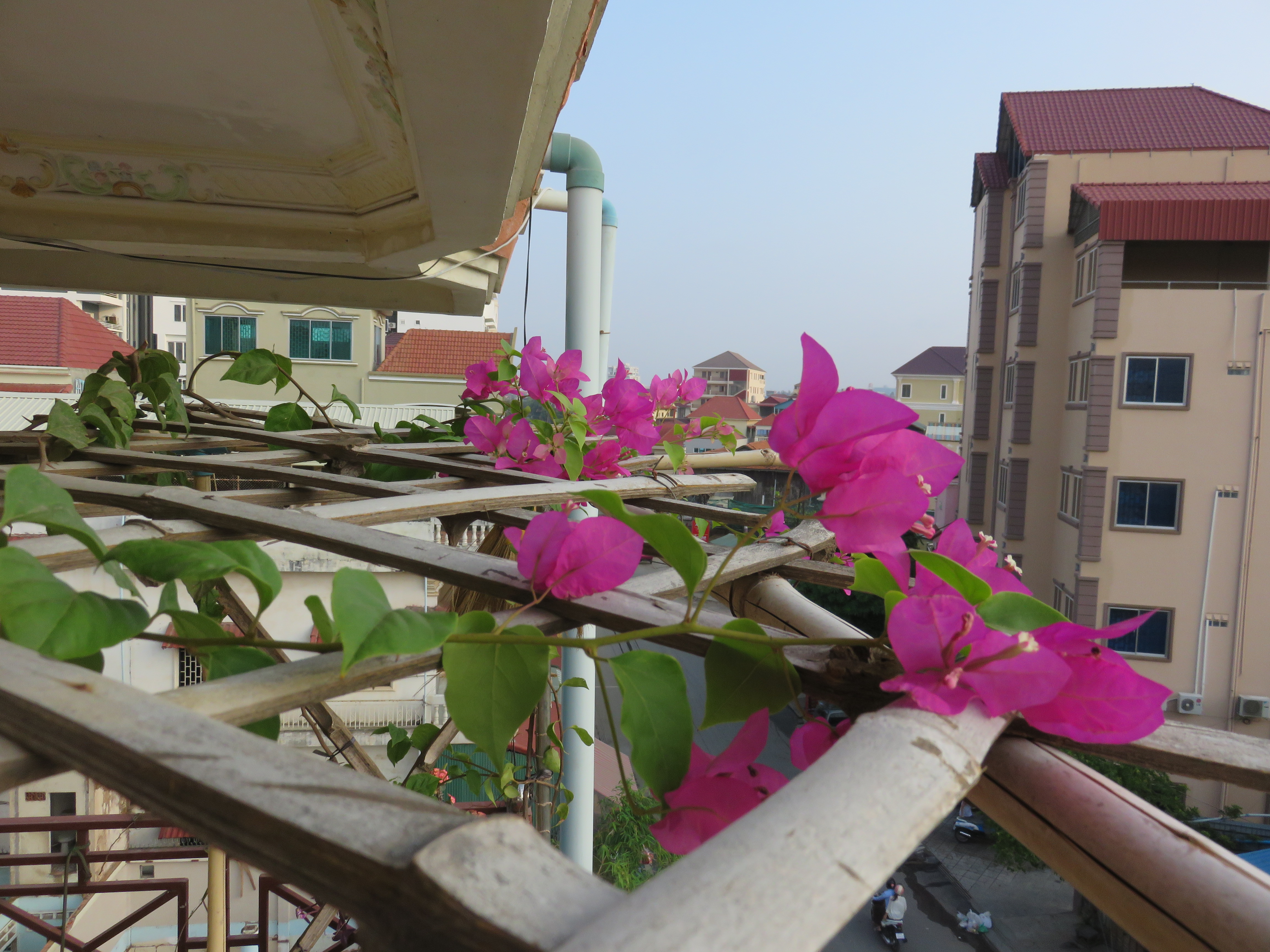Fifth Sunday of Easter (Year B)
Maria Montello
May 3, 2015
Acts 9:26-31; Psalm 22:26-27, 28, 30, 31-32; 1 John 3:18-24; John 15:1-8
I have two bougainvillea plants which I have trained to climb up a makeshift arbor on my balcony in Phnom Penh. The plants’ bursts of pink are my answer to the greys of concrete structures creeping in like kudzu throughout Cambodia’s growing capitol city. I enjoy my little garden in the sky. I am far from being a master gardener. I feel my way. One of the things I am the least comfortable with is pruning. I do understand cutting away brown and dried up leaves and branches. But why would one cut away what are often times perfectly strong branches, especially ones where gorgeous blooms have already burst forth? For me, pruning can be an almost painful process.
I feel a similar twinge when I read today’s gospel.
The gospel speaks of fruitful branches and unfruitful ones, of branches separated from the vine and those not, of branches thrown out and burned. The metaphor is clear: God is the vine-grower; Jesus is the vine; we are the branches. The implications follow naturally. God, the vine-grower, cares about us, tends to us, wants us to be healthy and to grow. To be fruitful we need to stay connected to the vine, to Christ, who is the source of nourishment, our lifeline. Our fruit belongs to the vine-grower, to God, and has its existence only because of our connection to the vine, to Jesus. That is, our fruit is a manifestation of our relationship with God. Naturally.
But then there is this talk of pruning. Not only does the gospel writer warn that God will take away every branch that does not bear fruit, he says that “every one that does [bear fruit] he prunes so that it bears more fruit.” As with my bougainvillea, I find hard to bear the cutting back of a beautifully fruitful sprig. What’s more: how can I be sure that the growth produced after pruning is better, stronger, more fruitful than that produced had I left well enough alone?
When I first decided to try to grow my bougainvillea plants vertically, I made a decision. I would prune the plant on the left so that only two main branches remained. The other plant I would leave untouched. A test. With time, the plant I made smaller via pruning did indeed become much more strong, its branches longer and it had more robust and bigger flowers. The one I left alone fanned out, its branches too thin to climb the arbor, its flowers mere whispers compared to its neighbors shouts. “Why?” I wondered.
After a plant establishes a firm footing in the soil and leaves enough to take in light, its energies go into thickening its roots and stems, and then growing up and out. The bud from which a new sprig grows produces a hormone, I read, which not only promotes lengthening growth of the main bud’s tip, the hormone also inhibits lateral bud growth, effectively reserving nutrients for the main bud. What I found most interesting about plant growth was in an article about unpruned trees. Unpruned trees are likely to produce large numbers of small, difficult-to-reach fruit; the weight of the fruit may even break the branch; and, worse yet, they only produce fruit every other year. This shed some light on further implications of the Gospel’s vine-and-branches metaphor.
When we listen to today’s Gospel, we need to ask ourselves two questions. What is it in me—my actions, my habits, my attitudes—that does not produce fruit; that is dry, withered, lifeless; that is separated from God? Second and more tricky, what is it in me that that, while virtuous and perhaps Christ-sprung, uses energy and life that would otherwise be concentrated on perhaps more important and fruitful endeavors? That is, what needs pruning in me?
The first might require we turn off the TV and read with our child at bedtime; limit our Facebook time to make way for “face time”; and, of course, eliminate all those things which we traditionally call “sins.” The second might mean we enjoy more time with our spouse and less with our colleagues. It might require we sit longer in prayer than on the exercise bike. It might mean it is time to let go of a few of our “virtuous projects.” Yes, pruning might mean that we slow or stop doing some “good” things to make way for God to grow in us and through us extraordinary fruit—fruit we can bear and sustain faithfully.
Oh God, I thank you for the life I have in and through you.
Protect me from busy-ness and from the self-importance it can render.
Give me prudence when choosing how to use the gifts you have given me.
Fortify me with your grace.
Make me fruitful.
I am yours.

